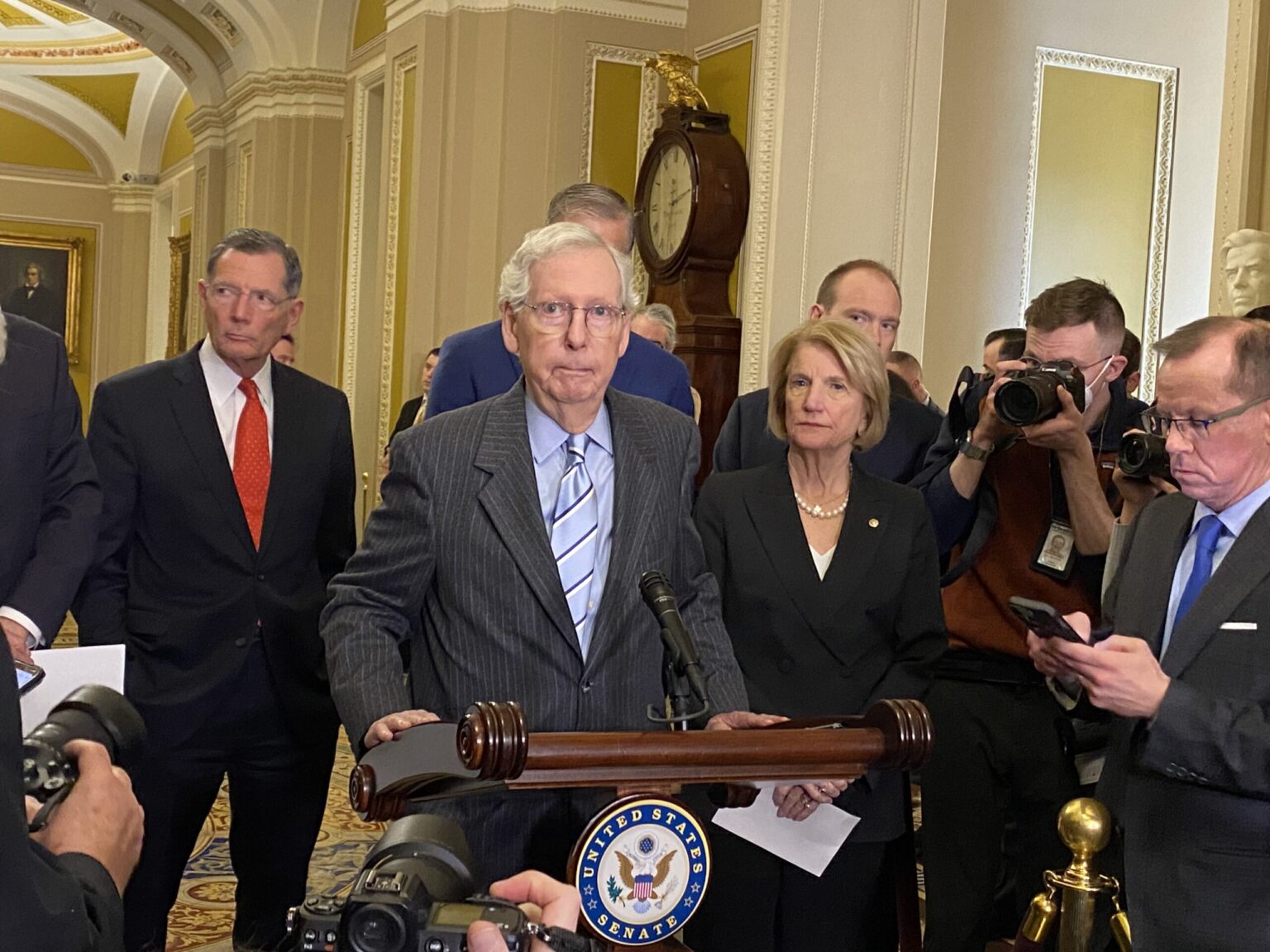15:33
News Story
U.S. Senate sends foreign aid bill to Biden as McConnell chides GOP ‘isolationist movement’
WASHINGTON — An additional $95 billion in military and humanitarian assistance for Ukraine, Israel and Taiwan cleared the U.S. Senate after a bipartisan coalition of lawmakers voted Tuesday to send it to President Joe Biden.
The 79-18 vote wrapped up months of debate within Congress about whether the United States should approve the aid or if it should turn inward amid rising global conflict.
Senate Minority Leader Mitch McConnell said during a press conference before the vote that he believed the strong support showed the GOP had “turned the corner on the isolationist movement.”
McConnell also rebuked former Fox News TV personality Tucker Carlson for repeatedly criticizing Republicans for approving military aid to Ukraine.
“I think the demonization of Ukraine began by Tucker Carlson, who in my opinion ended up where he should have been all along, which is interviewing Vladimir Putin,” McConnell said. “He had an enormous audience, which convinced a lot of rank-and-file Republicans that maybe this is a mistake.”
The legislation, which includes a national security bill aimed at forcing the sale of the popular social media app TikTok by its Chinese parent company ByteDance, passed the U.S. House on Saturday in a series of four broadly bipartisan votes.
The legislation was then wrapped together and sent to the Senate as one package to speed up its approval in that chamber.
Biden plans to sign the measure as soon as it reaches his desk.
Biden spoke with Ukrainian President Volodymyr Zelenskyy on Monday “to underscore the United States’ lasting commitment to supporting Ukraine as it defends its freedom against Russian aggression,” according to a readout of the call from the White House.
“President Biden shared that his administration will quickly provide significant new security assistance packages to meet Ukraine’s urgent battlefield and air defense needs as soon as the Senate passes the national security supplemental and he signs it into law,” according to the readout.
McConnell sees ‘a test on behalf of the entire nation’
McConnell gave a lengthy floor speech Tuesday before the vote defending the package as a way to bolster America’s global leadership and support American jobs.
“Today, the Senate sits for a test on behalf of the entire nation — it’s a test of American resolve, our readiness and our willingness to lead,” McConnell said. “And the stakes of failure are abundantly clear.”
The Kentucky Republican rebuked GOP lawmakers who have sought to delay or block the assistance, saying he would “not mince words when members of my own party take the responsibilities of American leadership lightly.”
“So much of the hesitation and short-sightedness that has delayed this moment is premised on sheer fiction,” McConnell said.
Investments in defense spending by the United States, he said, have led allies in Europe “to make historic investments of their own in collective defense,” which in some countries “is outpacing our own.”
American allies in Europe and the Indo-Pacific have collectively purchased more than $1 billion in weapons produced in American factories by American workers, McConnell said.
“Do our colleagues really think that will continue if America decides that global leadership is too heavy a burden?” McConnell asked.
Humanitarian help
Senate Appropriations Chairwoman Patty Murray, a Washington state Democrat, said securing the humanitarian aid in the package was a “red line” for her.
“At every stage of these negotiations, I made clear: Congress will not advance a supplemental that fails civilians,” Murray said. “I will not let us turn our back on women and children who are suffering, and who are often hit hardest by the fallout of chaos and conflict.”
That humanitarian assistance, Murray said, would go toward “civilians in Ukraine, Sudan, and Gaza, including kids who are caught in the crossfire, who are in desperate need of food and water and medical care.”
Maine Republican Sen. Susan Collins, ranking member on the Appropriations Committee, said the package would help bolster America’s national security at a crucial time in world history.
“The threats that the U.S. faces from an aggressive Iran and its proxies, an imperialistic Russia and a hegemonic China are interconnected,” Collins said. “How we respond to one affects how the other will operate.”
Vermont independent Sen. Bernie Sanders criticized leaders for not holding separate votes on the four bills in the package, as the House did, and urged them to hold votes on amendments that he said would improve the measure. Leaders ultimately did not hold amendment votes.
Sanders said he supports humanitarian aid, weapons for Ukraine and giving Israel more funding for defensive weapons, like the “Iron Dome to protect Israeli civilians from missile and drone attacks.”
But Sanders rejected the legislation providing “$8.9 billion in unfettered offensive military aid to the extremist Israeli government” and he sharply criticized Israel’s leaders for limiting aid to civilians in Gaza.
“We are now in the absurd situation where Israel is using U.S. military assistance to block the delivery of U.S. humanitarian aid to Palestinians,” Sanders said. “If that is not crazy, I don’t know what is. But it’s also a clear violation of U.S. law.”
How funds are allocated
The emergency spending for Ukraine, Israel and Taiwan appropriates the money to the U.S. departments of Defense, Energy and State. They would then use that funding to bolster military and humanitarian assistance to those three entities as well as other U.S. allies.
The $95 billion in funding would be divided up with $60.84 billion for Ukraine; $26.38 billion for Israel, though $9.15 billion of that total is for humanitarian assistance for Gaza and other “vulnerable populations;” and $8.12 billion for Taiwan and the Indo-Pacific.
That spending is extremely similar to a package the Senate passed in February, but it was stalled in the House for months as Speaker Mike Johnson, a Louisiana Republican, plotted a path forward.
The fourth bill in the package, dubbed the 21st Century Peace through Strength Act, is a 184-page measure that bundles together the TikTok divestment bill; anti-fentanyl legislation; and sanctions against China, Iran and Russia.
That bill also includes the Rebuilding Economic Prosperity and Opportunity for Ukrainians Act, or Repo Act, that would allow the United States “to confiscate Russian sovereign assets that have been frozen in the United States and transfer them to assist in Ukraine’s reconstruction efforts,” according to a summary.
Lawsuit expected from ByteDance
The TikTok bill would require Chinese owner ByteDance to sell the social media company within one year of the bill becoming law. It’s an attempt by lawmakers to reduce what some see as a national security risk to Americans’ data privacy.
ByteDance is expected to file a lawsuit challenging the law once it’s enacted.
Former President Donald Trump, now the Republican Party’s presumptive presidential nominee, used a possible ban of the app to rebuke Biden over the weekend.
Trump, however, left out that he attempted something similar when he was in the Oval Office.
“Just so everyone knows, especially the young people, Crooked Joe Biden is responsible for banning TikTok,” Trump wrote.
“Young people, and lots of others, must remember this on November 5th, ELECTION DAY, when they vote!” Trump added.
Trump attempted to ban TikTok in August 2020 through an executive order but was blocked by the courts.
“TikTok automatically captures vast swaths of information from its users, including Internet and other network activity information such as location data and browsing and search histories,” according to Trump’s executive order.
“This data collection threatens to allow the Chinese Communist Party access to Americans’ personal and proprietary information — potentially allowing China to track the locations of Federal employees and contractors, build dossiers of personal information for blackmail, and conduct corporate espionage.”
The bill forcing TikTok’s parent company to sell the app or face a ban in the U.S. was added to the emergency spending package by House Republicans. It passed that chamber over the weekend on a 360-58 vote with 186 of the ‘yes’ votes coming from GOP lawmakers.
Our stories may be republished online or in print under Creative Commons license CC BY-NC-ND 4.0. We ask that you edit only for style or to shorten, provide proper attribution and link to our website. AP and Getty images may not be republished. Please see our republishing guidelines for use of any other photos and graphics.




